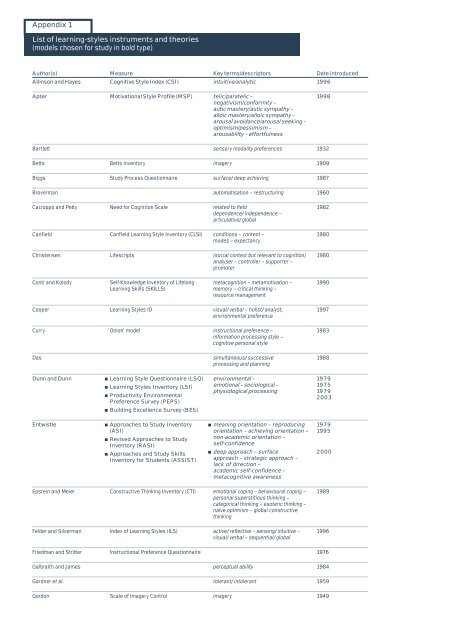learning-styles
learning-styles
learning-styles
You also want an ePaper? Increase the reach of your titles
YUMPU automatically turns print PDFs into web optimized ePapers that Google loves.
Appendix 1<br />
List of <strong>learning</strong>-<strong>styles</strong> instruments and theories<br />
(models chosen for study in bold type)<br />
Author(s)<br />
Allinson and Hayes<br />
Measure<br />
Cognitive Style Index (CSI)<br />
Key terms/descriptors<br />
intuitive/analytic<br />
Date introduced<br />
1996<br />
Apter<br />
Motivational Style Profile (MSP)<br />
telic/paratelic –<br />
negativism/conformity –<br />
autic mastery/autic sympathy –<br />
alloic mastery/alloic sympathy –<br />
arousal avoidance/arousal seeking –<br />
optimism/pessimism –<br />
arousability – effortfulness<br />
1998<br />
Bartlett<br />
sensory modality preferences<br />
1932<br />
Betts<br />
Betts Inventory<br />
imagery<br />
1909<br />
Biggs<br />
Study Process Questionnaire<br />
surface/deep achieving<br />
1987<br />
Broverman<br />
automatisation – restructuring<br />
1960<br />
Cacioppo and Petty<br />
Need for Cognition Scale<br />
related to field<br />
dependence/independence –<br />
articulative/global<br />
1982<br />
Canfield<br />
Canfield Learning Style Inventory (CLSI)<br />
conditions – content –<br />
modes – expectancy<br />
1980<br />
Christensen<br />
Lifescripts<br />
(social context but relevant to cognition)<br />
analyser – controller – supporter –<br />
promoter<br />
1980<br />
Conti and Kolody<br />
Self-Knowledge Inventory of Lifelong<br />
Learning Skills (SKILLS)<br />
metacognition – metamotivation –<br />
memory – critical thinking –<br />
resource management<br />
1990<br />
Cooper<br />
Learning Styles ID<br />
visual/verbal – holist/analyst,<br />
environmental preference<br />
1997<br />
Curry<br />
‘Onion’ model<br />
instructional preference –<br />
information processing style –<br />
cognitive personal style<br />
1983<br />
Das<br />
simultaneous/successive<br />
processing and planning<br />
1988<br />
Dunn and Dunn<br />
Learning Style Questionnaire (LSQ)<br />
Learning Styles Inventory (LSI)<br />
Productivity Environmental<br />
Preference Survey (PEPS)<br />
Building Excellence Survey (BES)<br />
environmental –<br />
emotional – sociological –<br />
physiological processing<br />
1979<br />
1975<br />
1979<br />
2003<br />
Entwistle<br />
Approaches to Study Inventory<br />
(ASI)<br />
Revised Approaches to Study<br />
Inventory (RASI)<br />
Approaches and Study Skills<br />
Inventory for Students (ASSIST)<br />
meaning orientation – reproducing<br />
orientation – achieving orientation –<br />
non-academic orientation –<br />
self-confidence<br />
deep approach – surface<br />
approach – strategic approach –<br />
lack of direction –<br />
academic self-confidence –<br />
metacognitive awareness<br />
1979<br />
1995<br />
2000<br />
Epstein and Meier<br />
Constructive Thinking Inventory (CTI)<br />
emotional coping – behavioural coping –<br />
personal superstitious thinking –<br />
categorical thinking – esoteric thinking –<br />
naïve optimism – global constructive<br />
thinking<br />
1989<br />
Felder and Silverman<br />
Index of Learning Styles (ILS)<br />
active/reflective – sensing/intuitive –<br />
visual/verbal – sequential/global<br />
1996<br />
Friedman and Stritter<br />
Instructional Preference Questionnaire<br />
1976<br />
Galbraith and James<br />
perceptual ability<br />
1984<br />
Gardner et al.<br />
tolerant/intolerant<br />
1959<br />
Gordon<br />
Scale of Imagery Control<br />
imagery<br />
1949


